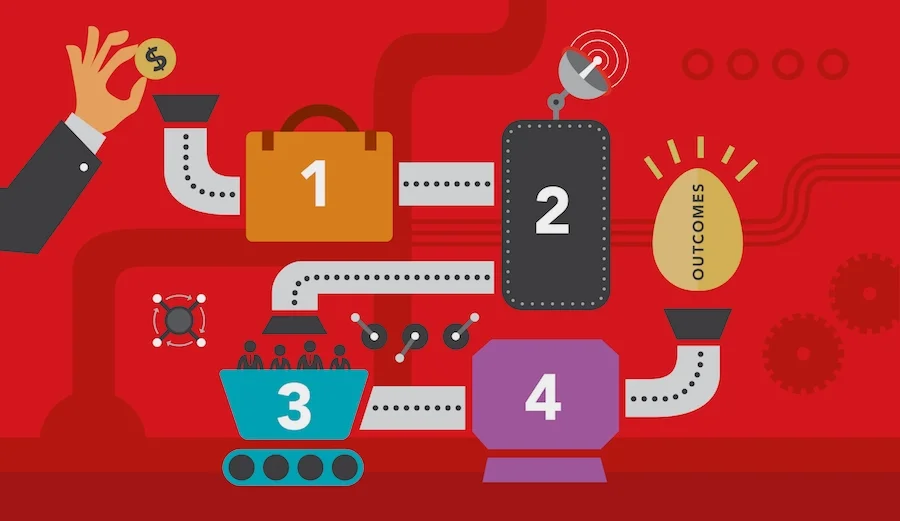“Buyer beware” might also be described as “sold as is” — a warning about deals that seem too good to be true. Given the power currently ceded to procurement professionals inside client organizations, “caveat emptor” applies to agency-client relationships more than ever before...
(CLICK HEADLINE TO READ FULL ARTICLE)
Do you feel locked in a zero-sum game with the professional buyers of your services (procurement)? Most firms do. A zero-sum game is one in which gains for one party result in losses for the other party. In effect, each party is fighting for a bigger slice of the same pie ...
Most professional firms have been marching down the path of cost-based compensation so long that it seems normal to answer questions about salaries, overhead, and even profit margins, but it is decidedly not normal. In no other industry — outside of classically-defined commodities — does the seller disclose their costs in this manner to the buyer ...
(CLICK HEADLINE TO READ ARTICLE)
Who bears the most risk in an agency-client relationship? Clients who buy hours are really only buying buckets of inputs that may or may not correspond directly with the needed outputs or produce the desired outcomes. Herein lies the risk being taken on by the client. The agency will work its hours and collect its fees regardless of whether or not the work is effective …
(CLICK HEADLINE TO READ FULL ARTICLE)
If your firm sells hours, how do your clients distinguish between paying for busy fools and eureka moments? Are they paying for middling plodders or proficient geniuses? Distracted muddlers or breakthrough brains? The billable hour, while arguably an easy thing to track, is not an easy thing to value …
The way to win more business is not to offer the best price, but rather the best pricing approach. Many firms will argue that their clients are “price shoppers,” and it’s true there are undiscriminating buyers in every market. But most smart clients understand you get what you pay for. The reason even some of them seem prone to “buy on price” is much more about how we sell than how they buy …
Would you like to earn money while you sleep? Most of your clients do. While most product and service companies have diverse ways of generating revenues, professional services firms generally don’t make money unless they’re recording hours on a timesheet. But an emerging crop of innovative firms across the globe are successfully cultivating new revenue streams, diversifying their sources of income, and yes, even making money while they sleep. How do they do it? Here are seven ways you can accomplish this in your own business …
Agencies are routinely given various “Scopes of Work,” then dutifully proceed to fulfill their client’s requests. But what’s missing from this sequence of events? What should come before the SOW? Our answer: the SOV — Scope of Value …
Why are firms like advertising agencies routinely criticized by clients for lacking the tools and practices that would make them more efficient? The answer in large part is that there are no real economic incentives in place to make these things happen. And if there's one thing economists agree on, incentives matter.
(CLICK HEADLINE TO READ FULL ARTICLE)
When you equip clients and prospects with options, you’re not only providing immensely useful decision-making context, you’re also fundamentally altering the dynamics of the agency compensation game. Offering different options changes the dialogue away from “How many hours will this take to “Which of these options would work best?” Showing different combinations of program elements and deliverables keeps the conversation focused on what clients really buy: outputs, not inputs …
Has your firm ever run into a pricing cliff, cascaded off a pricing waterfall, or put up a pricing fence? Chances are, no. That's because pricing in most professional firms like agencies is an oversimplified afterthought that consists of adding up your costs and calling it a price. But in client organizations, pricing is a core competency -- separate from finance -- that navigates through the minefields of pricing psychology to optimize profit margins for their company …
(Click on headline to read full article)
If you’re like most agencies and other professional firms, you’re likely missing a critical component in the model upon which you have built your business. Here's why having a cost structure is not the same as having a revenue model …
When a talented ad agency transforms the global reputation of a brand through a brilliant marketing program based on unique customer insights, that’s an example of the kind of high-value problem solving professional firms get hired for in the first place. It’s the kind of “magic” that characterizes knowledge work, creative thinking, and professional expertise …
(Click on headline to read full article)
When sitting face to face with the buyers of your services, remember you’re not just selling the value of the work you create. The value your firm brings to the table is deep and multifaceted. But don’t count on your client to point them out for you …
Knowing the costs of serving your clients is important, but it’s not the same thing as knowing how to price your services. Costing is objective and tactical; pricing is subjective and strategic. Costing uses formulas; pricing requires judgment …
















